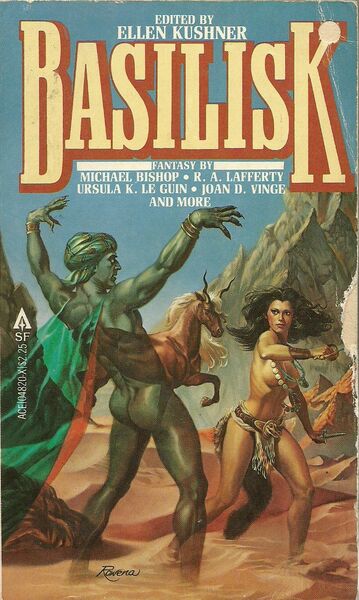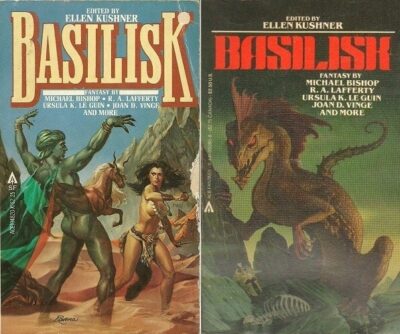A Box Of Chocolates
Basilisk
Edited by Ellen Kushner

20 Jul, 2025
Because My Tears Are Delicious To You
0 comments
Ellen Kushner’s 1980 Basilisk is a fantasy anthology. Interior illustrations are by Terri Windling.
While Kushner had appeared in Destiny mastheads, I believe Baslisk was her first cover credit.
It’s my impression that Ace under Jim Baen dabbled in illustrated fantasy books. This is one; The Magic Goes Away is another; I think The Demon of Scattery was a third. This innovation does not appear to have caught on.
Some readers have complained that this anthology contains no basilisks. No so! It’s right there on the front cover, the spine, and three times on the back cover. Expecting basilisks to appear in the stories themselves just seems greedy1.
Although Kushner has a specific flavour of fantasy in mind, she otherwise casts a wide net.
Now, this might have been due to haste. Black Gate contacted Kushner to ask why the 1980 and 1984 editions have different covers2. In the course of the interview, Kushner explained the anthology’s origin: the Rowena Morrill cover was commissioned for a Lynn Abbey novel. The Lynn was published with a different cover, leaving Ace with an expensive Rowena. It was Kushner’s task to assemble a fantasy anthology suitable for the cover.
Not the first time an SFF work was created around the cover art! But perhaps the anthology lacked focus because of its origin.
Another plausible explanation, the one I prefer, is that the selection reflected the rudimentary state of American fantasy3 in 1980. Fantasy had not yet eaten SF’s lunch, and the increasingly commercial genre had not yet had time to diversify into dozens of specialized subgenres.
In any case, Kushner provided readers with a broad range of stories, thanks to which they could better determine their own preferences.
Basilisk is out of print.
The contents in more detail:
Introduction: The Bonnie Road • essay by Ellen Kushner
A short introduction, outlining the anthology’s goal: highlight talented new authors and works by established authors readers may have missed. The specific coal seam Kushner intends to mine is European, with a nod to the medieval era.
The Hunt of the Unicorn • novelette by Joan D. Vinge
A cursed man and his cursed sister struggle with the choice of saving an imperiled Rider — guardian of order — from a malevolent sorcerer, which will come at great personal cost, or leave the Rider to their fate, which will come at great general cost. The cursed siblings’ reward will be meager indeed.
Readers may notice parallels between this story and the film Ladyhawke. Film writer Edward Khmara asserted the idea was all his, which I have no reason to doubt, but it is an amusing coincidence that of all the people who could have written the novelization for Ladyhawke, the studio picked Vinge.
The Man Who Sold Magic • (1965) • novelette by Nicholas Stuart Gray
A foolish young aristocrat makes a series of increasingly terrible bargains, each one intended to undo the consequences of the previous bargain.
From the young man’s perspective, he is in a horror story. From his more worldly father’s point of view, the events are a comedy.
Peter Kagan and the Wind • (1971) • poem by Gordon Bok
A doomed sailor seeks comfort from an unlikely source.
The Forty-Seventh Island • novelette by R. A. Lafferty
Supremely rational space colonists are aghast to discover that base superstition has followed them to the stars.
The Lamia and Lord Cromis • [Viriconium] • (1971) • novelette by M. John Harrison
A proud lord and his two ne’er-do-well companions set out confront a legendary monster.
How have I not reviewed any of the Viriconium works?
War Wounds • novelette by Lynn Abbey
Warrior priestess Rifkind fills time between thrilling novels with combat and a spiritual crisis.
Rifkind’s life sounds terribly stressful.
“Feel Free” • (1967) • short story by Alan Garner
A young man discovers both his artistic talent and the extremes to which he will go to overlook the mythological undertones of his surroundings.
“The Word of Unbinding” • [Earthsea Cycle] • (1964) • short story by Ursula K. Le Guin
A determined mage persists in confronting a far more powerful enemy.
This … was a much more straightforward conflict than I expect from Le Guin
“Grounding Song” • poem by Gordon Grant
A man searches for his boat, which I suspect is a metaphor for death.
“The Amulet” • poem by Gordon Grant
A shaman delivers justice.
“The Yukio Mishima Cultural Association of Kudzu Valley, Georgia” • short story by Michael Bishop
A disgruntled, unemployed professor sets out to expand his rustic neighbour’s literary horizons. What could possibly go wrong?
Wizard’s Domain • novelette by Elizabeth A. Lynn
A traitor is retrieved from the bottom of the ocean by the sorcerer he betrayed. Why? He is asked to deploy his duplicitous skills against a target of the sorcerer’s choosing.
One of the lessons here (aside from “don’t join badly thought-out plans to overthrow the incredibly powerful sorcerer who has rewarded you for faithful service”) is that it is better to make a graceful exit rather than clinging to a role for which one is no longer suited. Obviously, that will never apply to me, but I can think of a lot of people who would benefit from reading the story.
Select Bibliography • essay by uncredited
A list of works that readers who enjoyed this collection might want to track down. Some would have been easier to find than others.
The list is an interesting mix of familiar and unfamiliar (to me) works:
The Last Unicorn by Peter S. Beagle
The Face in The Frost by John Bellairs
The Book of Weird by Barbara Ninde Byfield
(also published as The Glass Harmonica)
The Silver Stallion by James Branch Cabell
The High Place by James Branch Cabell
The Borribles by Michael De Larrabeiti
The Worm Ouroboros by E. R. Eddison
Mistress Of Mistresses (and its sequels) by E. R. Eddison
The Owl Service by Alan Garner
The Animal Family by Randall Jarrell
The Spellcoats by Diana Wynne Jones
Charmed Life by Diana Wynne Jones
The Land of Green Ginger by Noel Langley
The Wizard of Earthsea (And its sequels) by Ursula K. Le Guin
The Wind’s Twelve Quarters by Ursula K. Le Guin
“From Elfland to Poughkeepsie” in The Language of The Night
by Ursula K. Le Guin
Swords In the Mist by Fritz Leiber
Swords Against Wizardry
(and others in the series) by Fritz Leiber
The Chronicles of Narnia (six books) by C. S. Lewis
Taash And the Jesters by Ellen Kindt Mckenzie
The Riddle-Master of Hed (and its sequels) by Patricia A. McKillip
The Forgotten Beasts of Eld by Patricia A. McKillip
The Perilous Gard by Elizabeth Marie Pope
“On Fairy Stories” in The Tolkien Reader (Tree and Leaf) by J. R. R. Tolkien
A Traveller in Time by Allison Uttley
The Book of The Dun Cow by Walter Wangerin, Jr.
1: The front and back cover design is very late Disco Ace. No barcode, because books didn’t have barcodes back then. More room for cover copy!
2: I prefer the 1980 cover because the title is more legible, although I do wonder what happened to the topless lady’s nipples.

3: USA delenda est.
